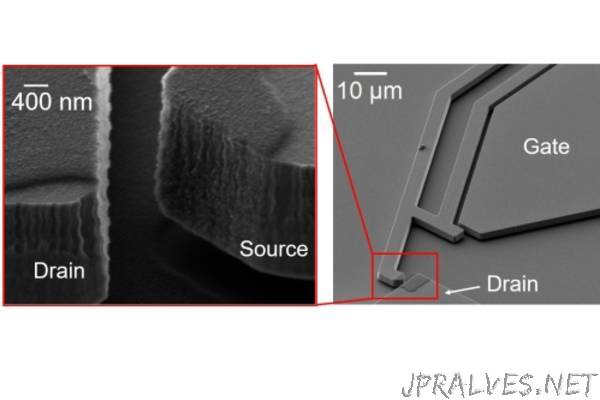
“Researchers from the Universities of Bristol and Southampton, in collaboration with Microsemi, have demonstrated reliable operation of microelectromechanical relays by coating the contacts with nanocrystalline layers of graphite, to enable ultra-low-power electronics for harsh environments.
Micro and nanoelectromechanical relays have effectively zero leakage current and can operate at much higher temperatures and levels of radiation than solid-state transistors. Such miniaturised relays have great potential to realise smart electronic components with integrated sensing, processing and actuation that are extremely energy-efficient.
The work, published in Carbon, demonstrates how films of nanocrystalline graphite that have a thickness of tens of nm protects the relay tips against degradation over millions of switching cycles and provides a reliable electrical contact.
The relays were designed by Dr Sunil Rana, a senior postdoctoral research associate at Bristol. The work was carried out as a collaboration between Bristol’s Microelectronics research group led by Dr Dinesh Pamunuwa, and Dr Harold Chong’s group at Southampton University, with Dr Jamie Reynolds and Dr Suan Hui Pu.
Dr Pamunuwa, Reader in Microelectronics at the Department of Electrical and Electronic Engineering at the University of Bristol and corresponding author on the paper, said: “This is a breakthrough result that could pave the way for a new class of extremely energy-efficient electronic components for use in emerging paradigms such as autonomous sensor nodes in the Internet-of-Things.
“The relays can withstand temperatures over 225˚C and can easily absorb radiation doses that are two orders of magnitude higher than transistors are able to withstand. The challenge has been to make them reliable, and these thin films of nanocrystalline graphite effectively act as a conducting solid lubricant, protecting the relay electrodes as they physically make and break contact millions of times.”
Dr Pamunuwa has been working on development of nanoelectromechanical relays for digital applications for over seven years, and this work has been supported by the UK government through grants from the Defence, Science and Technology Laboratory (DSTL), and Innovate UK as well as the EU.”
